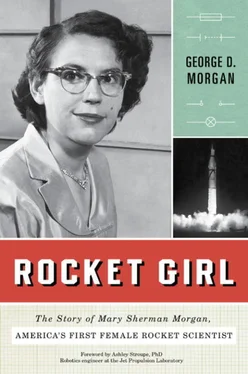That could have been the end of the story, and in fact I did expect the responsibility to my mother’s legacy to end with the closing of the play. I had done what Walter had instructed me to do—I had told my mother’s story; I had told people the truth. I had made sure she did not die nameless.
This is a story that should have ended right there. However, the production of the play, and the subsequent media attention it garnered, triggered a series of events I could never have foreseen. With the storm of attention that followed the play, we would all soon discover why our mother had spent her entire adult life refusing to talk about herself or her past. Unbeknownst to me or my siblings, Mary Sherman Morgan had lived her life hiding a number of secrets. The media attention that followed the play became the earthquake that rocked the foundation of those secrets and forced them out into the open.
This is a story that should have ended in November 2008. Instead, it was just the beginning.
Unsympathetic bankers, a hardscrabble land, and a growing season shorter than a John Deere brake shoe had for years combined themselves into a conspiracy of execution. It was here in a far corner of North Dakota the dreams of European immigrants came to die.
Undulating plains of grass extended in all directions to the horizon. To the south, a retreating gray mass of falling mist from some distant storm roared onward. Cutting the grassy plain in two, like a finger run through fresh paint, was a road. In summer the road was hard dirt. But this was late November, and after two days of rain it had become greased with the slimy mud of Dakota farm country. Pitted with water-filled ruts, and combed with gouges from old tractors, car tires were known to disappear into this muck at random. Fortunately, the driver of the 1930 Chrysler had been here before and knew where the soft spots were.
The Sherman farm soon came into view, its half-finished little spit of a house hardly bigger than a two-horse barn. It sat there atop its meager ten-acre plot, a fading brown memory waiting for time to finish its work. The bone-white paint that once adorned the structure had long since been blasted away by the Canadian winters, their winds indifferent to man’s imaginary borders, blowing ever southward through the flatlands like giant walls of sandpaper.
As the Chrysler approached, its passenger could detect a new sound wafting up along the air currents. It was the rhythmic creak of metal hinges, endlessly complaining about the farmer’s refusal to oil them. Betty Manning, a supervisor with Williams County Social Services, turned to look out the rear window, making certain the horse trailer was still attached.
The Sherman farm had once been encircled by a wooden fence, but it had collapsed long ago. Only the gate remained—a lone sentry protecting nothing from nothing. The Chrysler arrived and the driver, Sheriff Knowles, pushed the gate open with a gentle nudge from the car’s chrome bumper. Ten feet from the front porch, Sheriff Knowles cut the engine. He looked out his window to examine the front tire, now sunk a full hand-width into the wet sludge.
“Thirty miles from town is no place to get stuck.”
The “town” was Ray, a rail stop along State Highway 2 populated by three hundred hardy souls. (Seventy years later the population would grow to four hundred.) Small by any standard, its central location amongst thousands of square miles of farmland would one day inspire its residents to refer to their town as the “Grain Palace City.”
Betty opened her door and stepped out. “Rain or no we have a job to do.” She headed toward the farm house porch. It took only two steps for the mud to swallow one of her shoes.
“I’ll get it.” Sheriff Knowles retrieved the shoe, then helped her to the porch.
Betty was about to knock when she was distracted by a movement through the window. A young girl had been watching them, stepping out of view once she realized she might be spotted.
“Mary? Is that you in there?”
But there was no answer.
“Do you have the papers?” the sheriff asked.
Betty nodded, pulling them from a deep pocket in her dress. “Do you have handcuffs?”
He indicated where they were clipped to his belt.
“If he’s been drinking it might get nasty.” She raised her fist to the split-pine door and knocked loudly.
“Mister Sherman,” she called out. “It’s Betty Manning from Social Services.”
The sheriff leaned to one side to peek through the window. “He’s sitting in a chair. Asleep—or passed out.”
Betty knocked again. “Mister Sherman—please open the door.”
They waited, but when the door remained shut the sheriff reached out, turned the knob, and pushed the door open.
“Mike?”
Michael Sherman was hunched forward in a wooden chair, drunk and still. Around the chair, like a protective circle of wagons, lay a ring of empty wine bottles. At the far side of the room, eight-year-old Mary stood alone, pale and quiet.
“My dad’s asleep.”
Sheriff Knowles shook the man’s shoulder. “Mike—wake up. Come on, Mike.”
A single eye opened—then the other. He mechanically turned and tilted his head to address his rouster.
“Jeff? Whatta you doin’ here?”
“I’m afraid I’m going to arrest you if you don’t start obeying the law.”
Mike noticed there was a second person in the room. He turned slightly to see who it was.
“Oh. You.”
Betty stepped forward. “Mister Sherman, your daughter still is not attending school. She is eight years old—more than two years behind her peers. If you do not enroll her today you will be arrested.”
“I need her to clean the creamer.”
“Mary needs to be in school, sir.”
“This is a farm; we have chores.”
“This is country; we have laws.”
Michael turned his head and spat at an insect that had crept in through the floorboards. “How’s she gonna get across the river?”
“We’ve already been over this, Mister Sherman. The State of North Dakota will provide a horse she can use to get across the river to the schoolhouse.”
The Sheriff crouched down to talk to Michael face-to-face.
“Mike—Mary needs to be in school.”
“They took everybody. All my kids; Amy, the boys; everyone’s gone. To school.” He pronounced the word school with a deep drawl of disdain. “I need somebody to help me, Jeff. Elaine’s too young to do much. All I got is Mary.”
A young girl entered from a back bedroom and stood next to Mary. The sheriff addressed them.
“Girls—where’s your mom?”
Mike answered for them. “She’s visiting her sister.”
The sheriff reached out to Betty, who handed him a sheaf of papers. “It’s not just the law, Mike. It’s what’s right. It’s what’s right for your daughter.”
Michael took the papers. The sheriff removed a pen from his crisp uniform pocket and offered it up. As his eyes became adjusted to the dark room, Sheriff Knowles could better see the worn-out man sitting before him; the whiskery face and reddened skin, the unkempt hair, the half-open eyes peering through clouds of glaucoma and alcohol.
Michael managed to find the pen, took it, and affixed his signature.
“Now who’s gonna clean the creamer?”
Betty took the signed forms. “Why don’t you give it a try, Mister Sherman.”
She stepped farther into the room so Mary—hiding behind a small table—could see her.
“Mary. My name is Mrs. Manning. Do you remember me?”
The young girl nodded quietly, and Betty stepped closer.
“Would you like to go to school? Right now? There’s lots of other kids waiting to meet you.”
Читать дальше












